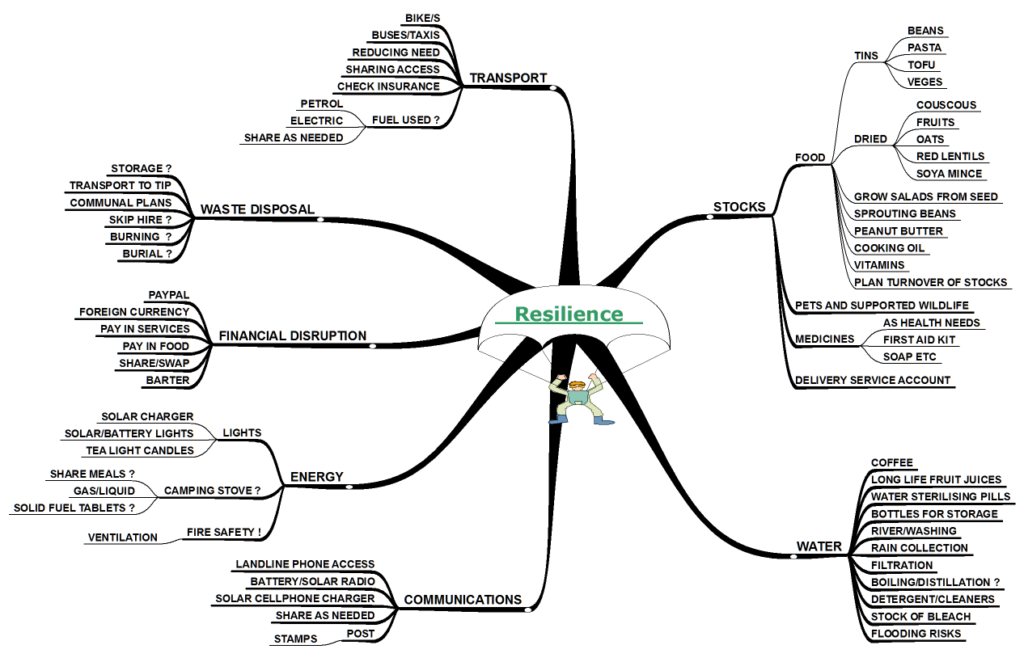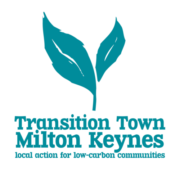Resilience
Resilience.
“The ability of a system or organization to respond to or recover readily from a crisis, disruptive process, etc.”
[Dictionary.com]
The Transition movement charts a communal journey away from the present age of consumerism, waste and obsession with economic growth, towards a green future, ending the mass use of fossil fuels and hence tackling the climate crisis. Like any journey, we all need a map, together with learning and sharing the skills and planning to foresee and avoid the hazards and potholes on our route. Rather than dealing with crises as they arise, Transition movements look ahead, try to foresee potential issues, and plan their way around them.
Some might call resilience the art and science of bouncing back. In Transition planning, resilience implies the purposeful foresight that enables us to “bounce forward” into a newer and more sustainable future. “Bouncing back” would suggest return to our past ways. They did not work. They are cooking our planet. We must not go back there. The best way to assess past crises is to learn how they can be averted in the future.

Transition planning spans many levels of communities, from individual to international.
- Citizens
- Households/parents/children/pets/supported wildlife
- Neighbourhoods/kith/kin
- Workplaces
- Districts
- Towns/cities/councils
- Regions
- Countries
- The World
Resilience must be part of all these levels of planning. Crashing and struggling through a sudden crisis just builds our isolation and fear. Planning and working together as a layered, networked community builds our vision and our strength.

What should a resilient local community look and feel like ? Insight. People look out for what is really happening around them, sharing factual data to help guide the community. There is a clear commitment to focus on priority issues that make a difference. Seeking “pawn moves”, as in chess, we aim for irreversible changes that shift the balance of power.
|
What issues does a resilient community need to address ? ….

At each level in the preceding levels list, what do we really need and what potholes might we encounter on our Transition trail ? How should we plan ? For what duration ? What assets will we require, from what sources ? When we look at potential ways to build resilience, in what ways we might help other people in our levels list ? How do we build and nurture our team ?
Some issues may be quite simple. A short-term domestic power cut due to a cable failure means we need to protect frozen food, keep warm, charge essential equipment, feed ourselves and have lights at night. Think about your neighbours – has their power failed too ? Can you help, share and work together ?
Other issues may be more complex. A viral pandemic needs real advance planning and coordinated, timely action. Some countries and some governments have coped well. Some are hopeless.
Local government contingency planning is carried out and plans publicised at regional levels. Milton Keynes comes within the area covered by Thames Valley authority, and the relevant documents are accessible via a dedicated online forum. There is also extensive data on UK National plans on the Government website here.
🐝 🐝 🐝 🐝 🐝 🐝 🐝 🐝 🐝 🐝
Let us think about a worked example of household Resilience planning – one that we may all feel the need to consider – Food. There could be a situation where we are unable to buy food; perhaps we are locked down in quarantine. Perhaps a neighbour is in the same situation and needs our help. Whatever the circumstances or causes, we plan to cope …..
Keep an adequate stock of basics in parallel with routine shopping, rotating goods so they do not go out of date.
You will need nourishing tinned and dried food like couscous, beans, vegetables, juices, porridge oats, soya mince for protein, vitamin pills, cooking oil, peanut butter, crackers. Do not rely on frozen food; a prolonged power cut will ruin it. Make sure that food tins are not damaged.
Remember food for pets and supported wildlife.
One shall not live by bread alone: Remember the coffee !
You will need basic means to cook, even if there is no power or mains gas. A portable camping gas stove will serve for holidays too, and it can be lent to friends and neighbours. Important: Follow the stove maker’s instructions on ventilation to avoid toxic carbon monoxide exhaust gas dangers.
🐝 🐝 🐝 🐝 🐝 🐝 🐝 🐝 🐝 🐝
Fancy growing your own food ! It’s great fun, healthy and good exercise. Check out our “Growing” webpage for details of our friends at the “Planting Up” project.
A community garden permaculture project connected with Transition Town MK to create a biodiverse green space for us to reconnect with art, nature and each other.
Check out their website and Twitter timeline
🐝 🐝 🐝 🐝 🐝 🐝 🐝 🐝 🐝 🐝
Planning need not entail hours of effort. Look around your home and list the products you really need and might chose to build resilience stocks. Check through your recent shopping receipts for ideas. Plan safe, dry storage spaces. Add extra items to your routine shopping, building stocks over time. It is simple really.
Other needs shown on the map above can be assessed in similar ways – deciding on plans and how to share assets and ideas within our communities.
🐝 🐝 🐝 🐝 🐝 🐝 🐝 🐝 🐝 🐝
The Psychology of Resilience
Our Transition Journey may entail dealing with uncomfortable uncertainties. Some people may feel uneasy thinking of ways to navigate the path ahead. But heading down the path without due planning and preparation is far scarier.
If you do find yourself facing difficult times – Covid or other – look after your welfare and your kith and kin. Take time and space to have fun, feel the sun and wind. Enjoy good music. Chat with friends and neighbours.
Check in with your children, show them the ways you are planning and why it is a cool, reassuring way of coping, not a scary idea to worry about. Deal with their questions with a positive mind set. A happy hug helps. Indeed, if you are looking for novel and innovative thinking, asking children to suggest answers can lead you to really useful and creative ideas ……

🐝 🐝 🐝 🐝 🐝 🐝 🐝 🐝 🐝 🐝
Useful links for further information ….
From the National UK Transition Network
Coping with the COVID pandemic.
https://transitionnetwork.org/news-and-blog/responding-to-covid19
Understanding personal resilience in Transition planning
https://transitionnetwork.org/do-transition/inner/personal-resilience-resources
Useful list of resources for coping with Covid, focusing on young people and education
https://dfemedia.blog.gov.uk/2021/02/01/mental-health-resources-for-children-parents-carers-and-school-staff
Urban planning for Resilience
https://en.wikipedia.org/wiki/Urban_resilience
Climate forecasting and resilience – in conjunction with the Metrological Office and Leeds University.
http://www.ukclimateresilience.org
On Twitter at https://twitter.com/UKCRP_SPF/with_replies
(USA) Post Carbon Institute
http://www.postcarbon.org
http://twitter.com/postcarbon
http://www.resilience.org
http://twitter.com/buildresilience
Stockholm Resilience Centre: Highly readable academic and international programme based at the University of Stockholm
http://www.stockholmresilience.org
https://twitter.com/sthlmresilience/with_replies
The Stockholm Resilience Centre also keeps a list of Twitter accounts of Resilience/Sustainability academics. It is mainly in English, but in-browser translation extensions may sometimes be helpful.
🐝 🐝 🐝 🐝 🐝 🐝 🐝 🐝 🐝 🐝

